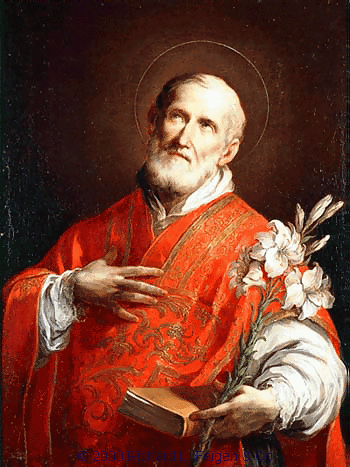
Philip Neri
Philip Romolo Neri CO (/ˈnɪəri/ NEER-ee; Italian: Filippo Romolo Neri, pronounced [fiˈlippo ˈrɔːmolo ˈneːri]; 22 July 1515 – 26 May 1595), known as the "Second Apostle of Rome" after Saint Peter, was an Italian Catholic priest noted for founding the Congregation of the Oratory, a society of secular clergy.
"Filippo Neri" redirects here. For the Italian footballer, see Filippo Neri (footballer).
Philip Neri
22 July 1515
Florence, Republic of Florence
26 May 1595 (aged 79)
Rome, Papal States
11 May 1615 by Pope Paul V
12 March 1622 by Pope Gregory XV
26 May
Rome, Italy; Candida, Italy; Mandaluyong, Philippines; US Special Forces; Institute of Christ the King Sovereign Priest; Catbalogan, Philippines; laughter; joy; comedians; artists; writers
Early life[edit]
Philip was the son of Francesco di Neri, a lawyer, and his wife Lucrezia da Mosciano, whose family were nobility in the service of the state. He was carefully brought up, and received his early teaching from the friars at San Marco, the famous Dominican monastery in Florence. He was accustomed in later life to ascribing most of his progress to the teaching of two of them, Zenobio de' Medici and Servanzio Mini. At the age of 18, in 1533, Philip was sent to his uncle, Romolo, a wealthy merchant at San Germano (now Cassino), a then Neapolitan town near the base of Monte Cassino, to assist him in his business, and with the hope that Philip might inherit Romolo's fortune.[1] Philip did gain Romolo's confidence and affection, but during his stay he also experienced a religious conversion. From then onward, Philip no longer cared for the things of this world. In 1533, he left San Germano to live in Rome. [2]
Personal character[edit]
Philip Neri embodied several contradictions, combining popular veneration with intensely individual piety. He became deeply involved with the Church while seeking to reform a corrupt Rome and an indifferent clergy.[7]
Philip possessed a playful sense of humor, combined with a shrewd wit. He considered a cheerful temper to be more Christian than a melancholy one, and carried this spirit into his whole life: "A joyful heart is more easily made perfect than a downcast one." This was the secret of Neri's popularity and his place in the folklore of the Roman poor. Many miracles were attributed to him. When his body was examined after death, it was found that two of his ribs had been broken, which was attributed at the time to the expansion of his heart while fervently praying in the catacombs about the year 1545.[9][3] Benedict XIV, who reorganized the rules for canonization, decided that Philip's enlarged heart was caused by an aneurysm. Ponnelle and Bordet, in their 1932 biography St. Philip Neri and the Roman Society of His Times (1515–1595), conclude that it was partly natural and partly supernatural. What is certain is that Philip himself and his penitents associated it with divine love.[6]
"Practical commonplaceness," says Frederick William Faber in his panegyric on Philip, "was the special mark that distinguishes his form of ascetic piety from the types accredited before his day. He looked like other men. ...He was emphatically a modern gentleman, of scrupulous courtesy, and sportive gaiety, acquainted with what was going on in the world, taking a real interest in it, giving and getting information, very neatly dressed, with a shrewd common sense always alive about him, in a modern room with modern furniture, plain, it is true, but with no marks of poverty about it – in a word, with all the ease, the gracefulness, the polish of a modern gentleman of good birth, considerable accomplishments, and widespread knowledge."[9]
Accordingly, Philip was ready to meet the needs of his day to an extent and in a manner which even the versatile Jesuits, who much desired to enlist him in their company, did not rival; and, though an Italian priest and head of a new religious order, his genius was entirely unmonastic and unmedieval – frequent and popular preaching, unconventional prayer, and unsystematized, albeit fervent, private devotion.[9]
Philip prayed, "Let me get through today, and I shall not fear tomorrow."[7]
Philip had no difficulties in respect of the teaching of his Church. His great merit was the instinctive tact that showed him that the system of monasticism could never be the leaven of secular life in the world of his day, but that something more homely, simple, and every day in character was needed for the new times then emerging.[9]
In popular culture[edit]
Johnny Dorelli played Philip Neri in a 1983 Italian movie State buoni se potete.
Gigi Proietti played Philip Neri in a 2010 Italian movie made for television, Saint Philip Neri: I Prefer Heaven.